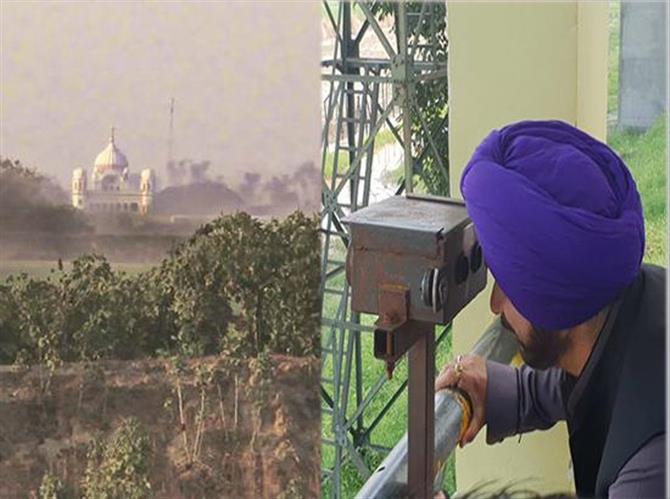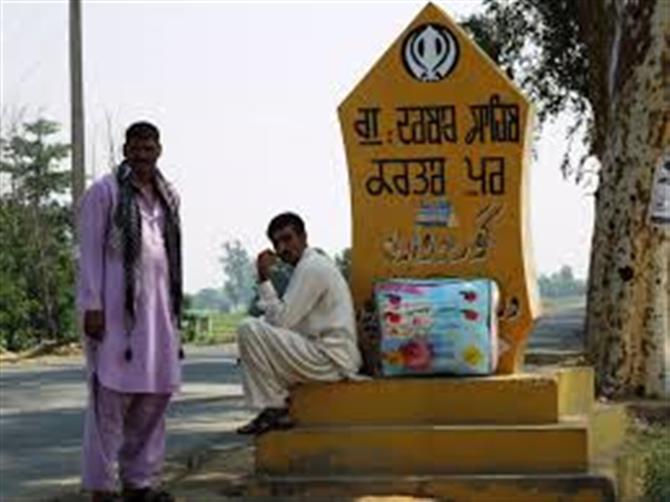There has been much furore in the media for the last few days regarding Punjab Local Bodies Minister Navjot Singh Sidhu’s visit to Pakistan. He, much to the flaring tempers of present day nationalists, received and gave love in the neighbouring country. Though his ‘hugging’ the Pakistan Army chief is looked upon as being avoidable, the much vocal minister has come to his defence with a loud logic. He claims, that the Pak Chief told him about opening the gates of Kartarpur Sahib to Sikh pilgrims, and that was enough for him to thank the Chief with a ‘Japphi’. The importance of the holy city to Sikhs lies in the fact that it was the first city, established by the Gurus of Sikhs. That one was established by the proponent of Sikhism, Guru Nanak, and that is where he settled after his travels in the four directions. That is where he established a Sikh community, and that is where he breathed his last. Hence, it is one revered place which Sikhs in India cannot visit and pay obeisance to, owing to the policies of the Governments of both countries.
The imposing and magnificent structure of Gurudwara at Kartarpur Sahib is visible from the border. Pakistani authorities generally trim the tall Elephant grass present at their side, to facilitate the view from the Indian side.
Sidhu says, the land becomes a literal Punjab only when the Indian and the Pakistani territory of Old Punjab come together. The nationalists cannot understand this feeling of incompleteness of having an incomplete homeland.

NavJot Singh Sidhu views Gurdwara Kartarpur Sahib from Indian border
The imposing and magnificent structure of Gurudwara at Kartarpur Sahib is visible from the border. Pakistani authorities generally trim the tall Elephant grass present at their side, to facilitate the view from the Indian side. Indian Sikhs gather at the border to perform Darshan from Dera Baba Nanak. Such is the reverence. Therefore, anyone offering to open a corridor which would allow devotees to go and pay their respects there, would definitely receive a hug!
But not many can understand this. Not man many nationalists would understand it. I think most of them would not. They cannot, simply because they do not have a part of their heritage lying there in the neighbouring country. When the country was Partitioned, it was not only the country, but the heart of Punjab too which got partitioned. As Navjot Singh Sidhu said in his press conference, Punjab ceased to exist in literal meaning then. Punjab is made from the root words, 'punj-aab', translating to, Five Waters. The name denoted the five rivers running across the land --- Satluj, Beas, Ravi, Chenab and Jehlum. Today’s Indian Punjab is the land of two rivers and a half, quite opposite to its name. The land becomes a literal Punjab only when the Indian and the Pakistani territory of Old Punjab come together. The nationalists cannot understand this feeling of incompleteness of having an incomplete homeland.
Others have only witnessed people criss-crossing the border. But they possibly cannot understand how it feels to leave one’s home, assets, and life built at one place since generations and forcibly moving to another land. The hardships endured by the people crossing borders were such that it has been engrained in their unconscious psyche that they are refugees. Talk to that generation, and they still long for their ‘home’ and call themselves refugees, even after seven decades of building a life in this country. I still hear the word ‘sharnarathi’ (refugee) in my home from my grandmother. Our generation possibly might not understand, but they feel displaced. The Print quoted veteran journalist Chanchal Manohar Singh saying, ‘Punjab’s cultural heritage lies in Pakistan as well. Those who are criticising Sidhu for going there are not expected to view Punjab’s relationship with Pakistan in the same way as we do here.’ Anyone visiting Pakistan can understand this. The love they shower, surprises anyone visiting from India. It is ironic and unbelievable, as our generation has grown up believing they are the villains, and the wrong doers. I quote another veteran journalist here, Gajinder Singh, who says, ‘Such is the love being showered on Indians visiting Pakistan, that if you visit Pakistan with 1000 INR in your pocket, you are very likely to bring back 800 INR back, and loads of stuff from there.’ All this, not because the Indian currency is stronger than Pakistan's, which it is, but because Pakistanis pamper the visiting Indians with such love, that they do not let you pay for anything. The rickshaw walah, the tea vendor, the cab driver, the shopkeeper, no one would accept money fro you, saying, ‘You, bhai jaan/apa, are our mehmaan!’ (You brother/sister, are our guests!)
This is precisely what Sidhu said, that all he felt when he went there was love being showered on him. That even after all the hate politicians spew on each other from both countries, all he received from people there was positivity and love. This love exists only because we share our culture, our waters, our history, and our heritage.

Milestoe Gordwara Kartarpur Sahib from Narowal City, Pakistan
Politics around us today is deranged, and has been reduced to shelling scathing comments on anyone who does not ascribe to the prevalent notion of nationalism, defined by a majority. And the precedent being set is dangerous. It is high time we put a check on this, from our side, and not let such hatred spread all over, if we want to save what is left of the ‘Great Land of Gods’.
It is only love between the people of both the countries which can win over this hatred, and I feel Sidhu’s visit was a proof of that. A proof of love people have for each other, and a proof of how capable the Indian nationalists are to spin that into hate.
Dear nationalists, this attitude of yours, instead of bring peace to the subcontinent, is going create a country which would not be able to say, ‘United We Stand’ anymore. Please ask your political bosses, what the plan is after that situation arrives.
I would like to quote the famous shayar from Indore, Rahat Indori here, who says:
सरहदों पर बहुत तनाव है क्या, कुछ पता तो करो चुनाव है क्या? (There is a lot of tension on the borders, is it election time yet?)